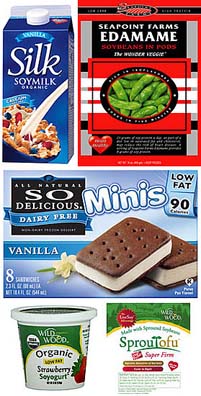Soy: In the Pink?
By Dr. Kaayla T. Daniel
Does soy prevent breast cancer or increase the risk? The debate heats up every October during Breast Cancer Awareness Month.  Sadly, soy is not the ticket to breast cancer prevention or reversal. Indeed, numerous studies suggest that it can cause, contribute to, or accelerate the growth of cancer -- especially breast cancer. Of course, this hasn't stopped the soy industry from stepping up its efforts to feed women's fears while urging health-conscious women to feed on soy foods, soy milk, energy bars and other products. Witness how Vitasoy will give away its soy milk in bright pink containers – called “Pinkies” – to women attending Komen Races for the Cure.
Sadly, soy is not the ticket to breast cancer prevention or reversal. Indeed, numerous studies suggest that it can cause, contribute to, or accelerate the growth of cancer -- especially breast cancer. Of course, this hasn't stopped the soy industry from stepping up its efforts to feed women's fears while urging health-conscious women to feed on soy foods, soy milk, energy bars and other products. Witness how Vitasoy will give away its soy milk in bright pink containers – called “Pinkies” – to women attending Komen Races for the Cure.
All soybeans – organic, commercial and GM – contain the phytoestrogens known as isoflavones. Although not identical to human estrogens, these plant estrogens are similar enough to fool the body, and can cause significant endocrine disruption. That can lead to a wide variety of symptoms, including thyroid disorders, reproductive problems, breast cell proliferation (a widely acknowledged marker of breast cancer risk), and even cancer itself.
The idea that soy isoflavones could prevent cancer is ludicrous given the fact that they are listed as “carcinogens” in many toxicology and chemistry textbooks. Furthermore, modern industrial processing techniques used to make soy protein isolate, textured vegetable protein and other modern soy products leave toxic and carcinogenic residues. Despite these well-known hazards, the soy industry makes the improbable claim that soybeans are the key to cancer prevention and reversal. After all, Asians have lower rates of breast cancer and “everyone knows” they eat a lot of soy.
In fact, Asians eat soy in very small quantities, as a condiment in the diet and not as a staple food. What's more, they eat old-fashioned whole soy bean products such as miso, tempeh, natto and tofu, not the new heavily processed products sold by the soy industry such as soy milk, veggie burgers, shakes and energy bars.
The Israeli Health Ministry, French Food Agency, German Institute of Risk Assessment and Cornell University's Center for Breast Cancer and Environmental Risk Factors have all warned women to “exercise caution” regarding soy consumption if they've been diagnosed with, or have a family history of, breast cancer. Clearly, possible benefits are far outweighed by proven risks.
Kaayla T. Daniel, PhD, CCN, is known as The Naughty NutritionistTM because of her ability to outrageously and humorously debunk nutritional myths. She is the author of The Whole Soy Story: The Dark Side of America's Favorite Health Food, which has been endorsed by leading health experts including Russell Blaylock, Kilmer McCully, Joseph Mercola, Doris J. Rapp, Jonathan Wright and JJ Virgin. A popular speaker and seminar leader, she will speak at the November 2009 Weston A. Price Foundation conference. In 2010 Dr. Daniel will take her three-day workshop on healing infertility nationwide. She is available for nutritional consultations and can be reached at kaayla@drkaayladaniel.com, on Facebook or at 505-266-3252.